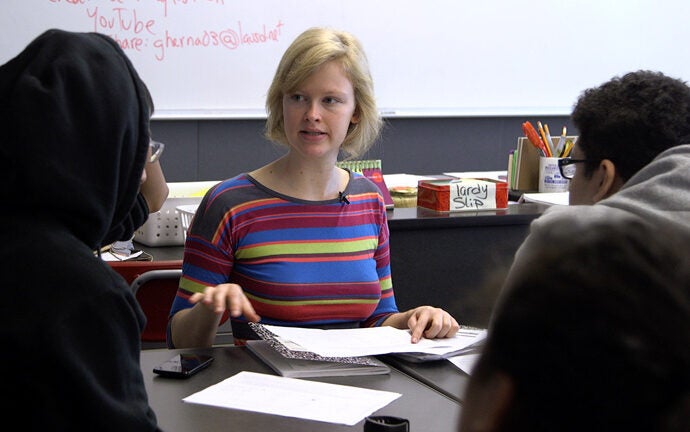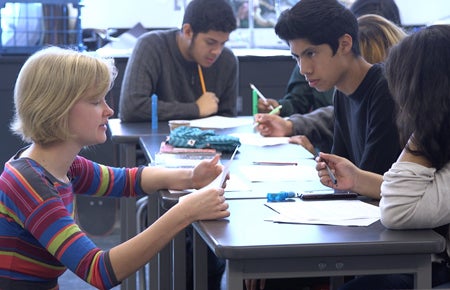
Through giving, student gets plenty in return
USC Dornsife junior Katie Bolton stood before a classroom of high school seniors at the Robert F. Kennedy Community Schools in Los Angeles, flanked by two other USC undergraduates.
“What are some of the reasons people immigrate?” she asked the class.
A girl shyly raised her hand. “Better economic opportunities?” she offered.
“Fleeing from a conflict or war,” called out a boy.
“Right, good ideas,” Bolton nodded.
Having the students’ attention, Bolton then introduced a teaching framework called “Four Worlds” designed to help them hone critical thinking skills in the area of social sciences.
“Basically, the point of it is to break down a really complex issue into more understandable parts,” she explained to the class. The lesson is part of USC Dornsife’s Teaching International Relations Program, or TIRP.
A seasoned volunteer
Bolton is a veteran participant in the service learning program. In teams of three, undergraduates go out to a local high school classroom four times over the course of a semester to teach interactive lessons on complex global issues.
High school teachers choose a theme for these lessons, with topics ranging from ethics and human rights to globalization, climate change, and competing perspectives and election issues, a popular selection this fall. For their teaching, undergraduates use a combination of analytical tools, case studies and activities drawn from the Activities Database at the Center for Active Learning in International Studies (CALIS). They also receive feedback on their lessons from partner teachers.

Katie Bolton has participated in the TIRP service learning program multiple times. “It’s a fulfilling thing to do service-wise,” she said.
Bolton, a double major in NGOs and social change and environmental studies, helped to edit and compile the curriculum for the newest section on climate change when she worked in the office of Steve Lamy, professor of international relations and vice dean for academic programs. Lamy, a believer in the idea that “you learn best by teaching,” spearheaded the program at USC in the 1990s.
“After helping with that project, the following semester I decided to volunteer and see what TIRP was all about,” Bolton said. “I’ve been doing it every semester since. It’s a fulfilling thing to do service-wise, working with students who are pretty similar in age and getting to see the wheels turning in their minds.”
Getting involved outside the classroom
As with the TIRP curriculum, Bolton has a decidedly interdisciplinary focus in her studies. When choosing schools, the East Texas native ruled out a few of the other top universities in California.
“What really drew me to USC was the fact that there were so many interdisciplinary majors. I felt like I would have an easier time finding the types of opportunities I was looking for.”
In addition to TIRP, Bolton is involved with a few campus organizations, including the USC Trojan Debate Squad and Environmental Core, an environmental activism club. This semester, the political science minor is also interning in the district office of California State Senator Holly Mitchell.
“I’m interested in politics in general and I wanted to get experience in an office with an elected official,” Bolton said. “And Senator Mitchell is really dedicated to the issues that are of concern to her constituents.”
Bolton is part of the inaugural class of USC Dornsife’s Fisher Fellows Program, which enables students with financial needs to participate in enrichment opportunities across the college. She enrolled in a Problems Without Passports course that allowed her to travel to Palau, ENST 480: “Integrated Ecosystem Management in Micronesia,” and earned a Summer Undergraduate Research Fund award to support the endeavor.
A mission of relevance for the community
CALIS Director Teresa Hudock said that TIRP provides an excellent opportunity for students to refine their skills in presenting, teaching, engaging an audience and organizing ideas. This semester, CALIS is supporting 39 teams of TIRP undergraduates teaching at a variety of public, charter and parochial high schools in L.A. Volunteers come from majors across USC Dornsife, not just those studying international relations.
The primary mission of CALIS is to be relevant to the community, Hudock said, and being able to do this through USC students is perfect both for them and for local youth.
“What I love about what we do is that we’re enabling [high school] students to really analyze issues,” Hudock said. “That’s what’s unique about CALIS materials and strategies. I consider what we’re developing with analytical tools is a paradigm shift in education. TIRP is this wonderful laboratory, and USC students are helping us create the paradigm shift.
“That’s the bigger picture of what TIRP is — service learning and community engagement, but the participants are also part of something bigger.”
Bolton, a first-generation college student, has appreciated being part of the bigger picture at USC and beyond.
“At USC there are so many opportunities in every way you can imagine: scholarships, service, organizations,” Bolton said. “I never worry about ‘what am I going to do next?’”